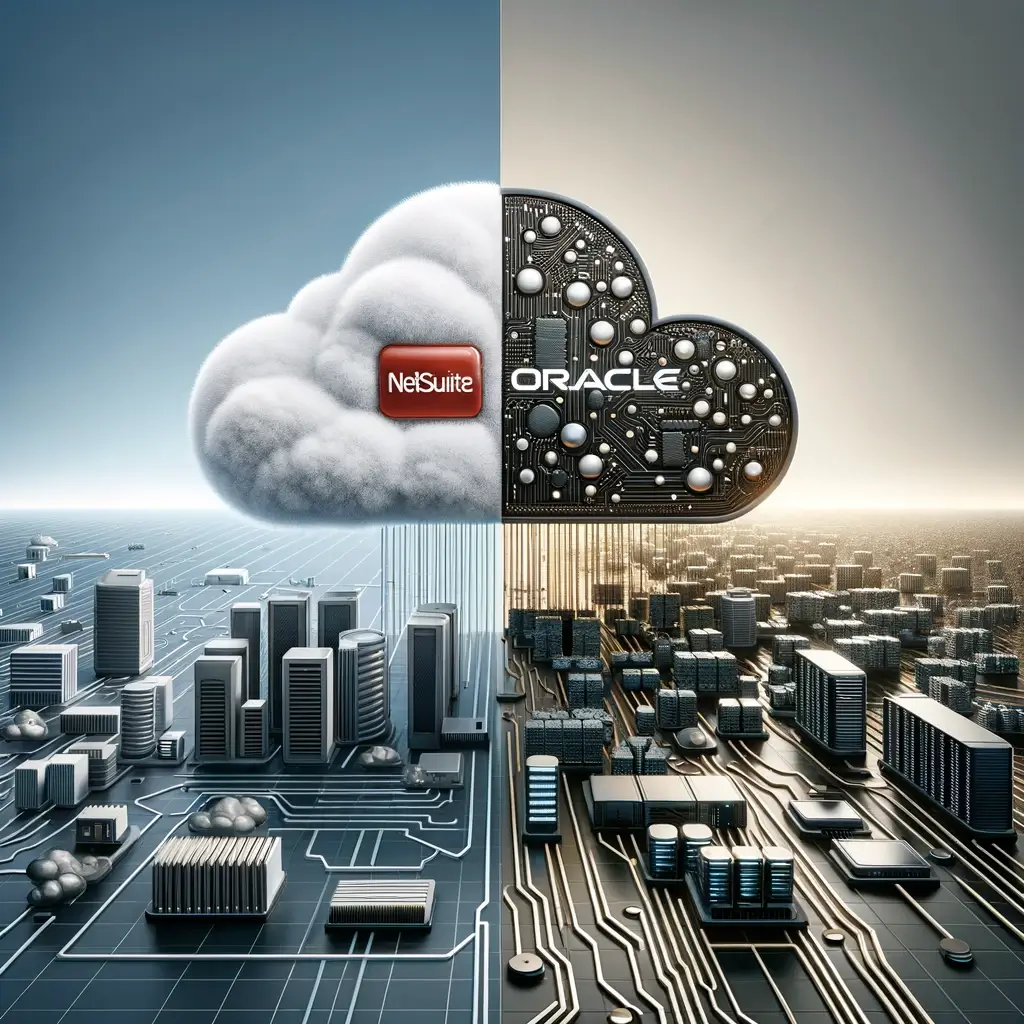Introduction Choosing the right ERP (Enterprise Resource Planning) system is a critical decision for any business. Two top contenders, NetSuite and Oracle, often lead the conversation. While both offer robust ERP solutions, they cater to different business needs and sizes. In this guide, we’ll break down the differences between NetSuite and Oracle, focusing on their features, pricing, usability, and more to help you make the right choice.
Background: NetSuite vs. Oracle
- NetSuite : Launched in 1998, NetSuite is one of the first cloud-based ERP systems. It offers an all-in-one business management solution designed to scale with growing businesses, making it popular among small to medium-sized businesses (SMBs).
- Oracle : Founded in 1977, Oracle is a giant in the software industry. Its ERP solutions, particularly Oracle ERP Cloud, are known for being highly customizable and tailored for large enterprises with complex needs.
Key Differences Between NetSuite and Oracle
| Feature | NetSuite | Oracle ERP Cloud |
|---|---|---|
| Target Audience | Small to mid-sized businesses | Mid-sized to large enterprises |
| Product Focus | Integrated ERP, CRM, and e-commerce | Highly customizable for complex needs |
| Deployment | Cloud-based | Cloud-based and on-premises options |
| Customization | Flexible with SuiteScript | Highly customizable but more expensive |
| Integration | Strong internal and API integration | Extensive across Oracle products |
| Usability | User-friendly and easy to learn | Complex but highly functional |
| Pricing | Subscription-based, predictable | Varies widely, higher for large enterprises |
| Global Capabilities | Supports multiple languages/currencies | Superior global features for large firms |
| Industry Solutions | Broad industry coverage | Tailored industry-specific solutions |
Detailed Comparison
- Target Audience
- NetSuite: Best suited for SMBs and growing companies looking for a scalable cloud-based ERP system.
- Oracle ERP Cloud: Designed for large enterprises with complex processes that need high customization and flexibility.
- Features and Functionality
- NetSuite: Offers a unified suite including ERP, CRM, eCommerce, and inventory management. It’s cloud-native and accessible anywhere.
- Oracle ERP Cloud: A highly customizable ERP system with features for finance, project management, procurement, and more. Oracle integrates with a broad range of applications.
- Deployment and Accessibility
- NetSuite: Fully cloud-based, allowing easy access from any location with an internet connection.
- Oracle: Offers both cloud and on-premises options, giving businesses more control over data and security.
- Pricing
- NetSuite: Pricing is based on a subscription model and is more transparent, making it cost-effective for SMBs.
- Oracle ERP Cloud: Also subscription-based but tends to be more expensive due to its customization options. It’s often chosen by larger enterprises with more complex needs.
- Ease of Use
- NetSuite: Known for its ease of use with an intuitive interface.
- Oracle ERP Cloud: While powerful, it has a steeper learning curve because of its complexity and extensive features.
Which ERP System Is Right for You?
- Choose NetSuite if you’re a small or medium-sized business looking for an all-in-one cloud solution that’s easy to implement and scale as your company grows.
- Choose Oracle ERP Cloud if you’re a large enterprise with complex processes and the need for extensive customization and industry-specific solutions.
FAQ: Frequently Asked Questions
- Is Oracle and NetSuite the same company?
- No, Oracle acquired NetSuite in 2016, but they operate as separate entities with different focuses.
- Is NetSuite part of Oracle?
- Yes, since Oracle’s acquisition of NetSuite in 2016, it is now a subsidiary of Oracle.
- Is Oracle NetSuite an ERP?
- Yes, NetSuite is a cloud-based ERP system offering financials, CRM, e-commerce, and inventory management.
- What is the difference between Oracle EBS and NetSuite?
- Oracle EBS is tailored for large enterprises with both cloud and on-premises options, while NetSuite is a cloud-only ERP designed for small to medium-sized businesses.
- Is Oracle a database or ERP?
- Oracle offers both. Oracle Database is a popular RDBMS, and Oracle ERP Cloud is a comprehensive ERP solution.
Conclusion
The choice between NetSuite and Oracle ERP depends on your business size, complexity, and growth goals. NetSuite is ideal for SMBs needing a scalable and straightforward solution, while Oracle ERP Cloud is perfect for large enterprises with specific and complex requirements.





